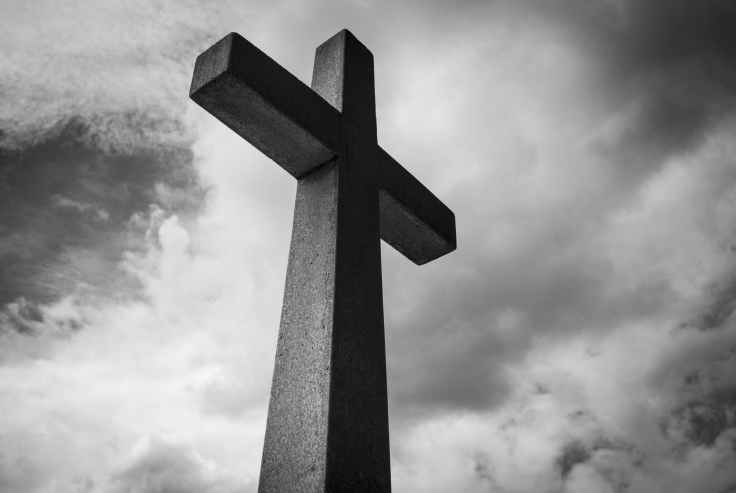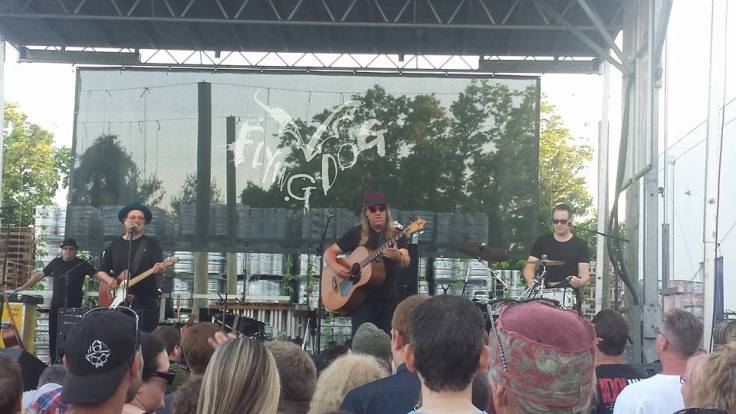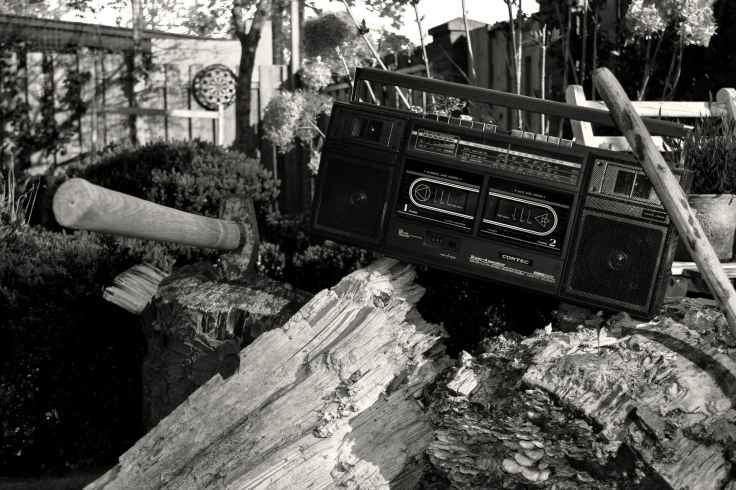Going into my freshman year of high school, most of the music I listened to was pretty standard. It was the stuff you would hear on classic rock radio, or just regular rock radio at the time. I’m not sure who I would have identified as my favorite band, but it was probably John Mellencamp or maybe the Black Crowes (I realize I’m dating myself here). My older brother listened to a lot of hard rock and heavy metal. Iron Maiden, Guns and Roses, Metallica, that sort of thing. We both liked Led Zeppelin, he more so than me, but neither of us changed the station in the car when ‘Immigrant’s song’ came on. Pearl Jam and Nirvana hadn’t quite hit yet. My ska and punk years were still a ways away. I remember being particularly into the Who and Kiss at the time.
I was nowhere near the insufferable music nerd that I am today, but I can pinpoint the album that started me on my way, ironically because of a youth religious retreat.

My parents are both hippy ministers. Normally people think of preachers families as strict or very button down. It wasn’t so with mine. My mother was one of the first women to become a methodist minister, and my father became a methodist minister after being raised Jewish. My mom went to Woodstock and my dad tells a story about wandering around his college campus in the rain playing a kazoo. The point is, my family is basically a collection of free spirits, despite being raised in the church. They were both involved in a movement called ‘Tres Dias’. Without getting too far into it, the Tres Dias movement is basically if someone poured all of the more loving and positive teachings of the gospels on the ground, mopped them up with a tie dye shirt, wrung that shirt out into a glass, and then drank out of the glass for three days while people played acoustic guitars. It was a series of weekend retreats where you learned to ‘walk closer with Jesus’. All joking aside it’s a pretty profound experience for a lot folks, enough that they made a version for teens called Emmaus.
I didn’t have a lot of choice in whether I went on the weekend retreat I attended or not. My mother, and basically everyone in my church, were deeply involved with Tres Dias, and so my brother, our friends Kelly, Christine, and I got signed up. Emmaus is a ecumenical weekend and so despite being Methodist we went to a weekend organized by a different denominational church in a town 40 minutes away from ours. None of us were particularly thrilled about it. I remember when the weekend finally rolled around my mother, who is particularly sensitive about Jim Jones jokes, getting pissed at me for making a joke about drinking the kool-aid. I was kind of an asshole when I was 14.
One of the reasons we were all trepidatious about this was that this weekend was going to be with a lot of people we didn’t know. There was also an economic element. Bethel is from a more well off area of Connecticut than the part of Stamford we all lived in. Stamford itself had some deep divides between very rich and blue collar, but the feeling was the more north you went in the state, the worse that got. Looking up the median incomes now proves to be mostly bullshit, but I remember having that impression. The point is we were about to go on a three day religious retreat with a bunch of kids we didn’t know and didn’t have the best attitude about it.
The weekend ended up being a pretty profound experience. Not so much from a religious perspective, but it’s an emotional retreat and when you experience a lot of raw emotions as a teenager you tend to form some pretty tight bonds with the people around you. It’s impossible to not get close when you spend three days crying and singing together in the woods. The organizers knew the score so part of the setup is scheduled reunions.

The first official reunion was essentially a party a few weeks later in Bethel. A group of us ended up having a few get togethers later on, but it was that first reunion that is the point of all this.
The reunion was the first time we all met under less heightened circumstances, so everyone was more themselves. It was closer to a regular party, so the music wasn’t all church music. The group of kids being a whole difference scene ended up exposing the lot of us to a whole different kind of band.
That night was the first time I ever heard the Violent Femmes and Nine Inch Nails. Up until that point the closest I got to college / alternative rock was a ‘Personal Jesus’ by Depeche Mode. In fact I remember teasing the aforementioned Kelly for liking REM, despite liking the song ‘Stand’. I mentioned I was kind of an asshole, I was also pretty dumb.
It’s hard to really say how profound a moment it was for me. In part because it didn’t feel like it at the time. I’ve mentioned in previous blogs about being struck instantly by music. This wasn’t one of those. I think it’s because I didn’t really quite realize what I was hearing. I knew it was new music, and I knew I liked it, but I didn’t know it was going to start leading me down a whole knew path. The Nine Inch Nails stuff was from Pretty Hate Machine, and at the time I only really liked ‘Head Like a Hole’. But the Violent Femmes album was different, it stuck with me.

Going from listening to ‘Destroyer’ by Kiss and ‘Shake your Money Maker’ by Black Crowes to listening to Violent Femmes eponymous debut is a bit like getting hit in the face with a fish. It’s cold, wet, and you really don’t quite know what just happened. That’s how I remember that whole reunion party. Everything just being different.
Violent Femmes, a three piece from Wisconsin, didn’t sound like anything I had ever heard. Gordon Gano’s voice barely even sounded like it came from the same species as the singers in the other bands I loved. It’s nasally, whiny, and defiant. There’s nothing sexy about it. There’s nothing larger than life about it. It sounds like the kind of voice you hear trying to sing a Prince song at Karaoke and not bothering with most of the inflection. It was as far from John Mellencamp as you could get while still including guitars and drums.
Christine, who was at the reunion and lived up the street from us, went out and bought the album a few days later and brought it over one day so I could make a tape of it. I wore that tape out over the next year or so.
It’s a strange, herky jerky kind of album. It starts off with what I would imagine is their most famous song, ‘Blister in the Sun’. To this day I’m not sure what it’s supposed to be about. I know I used to think it was about masturbation, and now I’m not sure it’s about anything. I have a lot of arguments with another music nerd friend about artist intent vs personal interpretation, and in this case I think the latter is more important. I know what the song means to me for sure. For me, it’s a summer song about youth and freedom, and those days when it’s warm out and you have nothing to do any you can just exist. It’s about being carefree and strange. It makes me think of being yourself and flaunting it.
The next song is ‘Kiss Off’, which is probably my favorite of all their songs. It starts slow and then explodes, or as much as they’re capable of exploding, into the chorus. The song feels like it perfected the loud quiet loud template three years before the Pixies even met. To my mind it is also one of the most perfect anthems to teenage disaffection, misanthropy, and angst. Well, maybe not just teenage, because the themes of the song still speak pretty loud to me. It’s a defiant song that is aware of the limits of defiance in the face of everything and doesn’t care.

‘Please Do Not Go’ is what passes for a love song on the album. It’s also one of my all time favorite acoustic guitar intros. It’s another one of those songs that was so utterly counter to everything I was listening to at the time that I was a little dumbstruck in how to process it at the time. When you’re used to stuff like ‘Lonely Ol Night’ by John Mellencamp, hearing Gano beg a woman to not go in the song was profoundly closer to my experiences as a dipshit teenager.
‘Add It Up’ comes next. This was another one that resonated pretty deeply with teenage me. If you know the song, you know they ask a lot of questions, and they are very similar to questions I spent a lot of time thinking about at 14 through 25. I never went downtown to buy a gun, or wanted to, but the frustration with life not being what you wanted it to be certainly made a lot of sense to me at the time. This song also contained one of the most confusing misheard lyrics of my life. Gano talks about grasping and reaching for a leg of hope. Except it doesn’t sound like ‘hope’, it sounds like ‘moke’. I had no idea what the hell a ‘moke’ was. At some point I heard that moke meant ‘donkey’ in England and let me tell you, that did not help me make sense of the song.
Those four songs are one of the best opening salvos of any album in my collection. Together they tell an almost perfect story of being a teenager who is not one of the cool kids. The next song, ‘Confessions’, was for whatever reason not a favorite of mine. It’s a good song, and I understand why people love it, but something about the repetition always bugged me. It sounds to me like the tail end of an evening of heavy drinking, when everyone is spent and just hanging on before you finally give up and go home to sleep it off. I remember too many of those mornings and they’re not the fun sepia tone part.
My favorite lyric on the whole album is the first line of ‘Prove My Love’ which comes next, and the first song of side two if you’re listening on vinyl, “Just last I was reminded of just how bad it had gotten and just how sick I had become”. It’s a pretty top notch way to kick off the second side of your album. It’s a bouncy, fun sounding, song. The lyrics are kind of bleak, which run counter to how upbeat it is, but the dichotomy makes it great. I think it works well, and it’s one of the songs on the album that I find myself listening to more often now than I did back then.
“Promise” is all sharp edges. The guitar keeps hitting harsh notes that sound like emphasizing the ‘k’ in “fuck”, but musically. The lyrics are bitter and angry. There whole song has the energy of broken glass and drinking a fifth of whiskey alone in your room after getting dumped.

‘To the Kill’ feels like a continuation of ‘Promise’ except after finishing the bottle. If sad angry drunk dialing an ex was set to music, this is what it would sound like.
Gnarls Barkley did a cover of the next song a couple of years back that kind of caught the heart of it. ‘Gone Daddy Gone’ has that descending repeating riff done on a xylophone. It’s the main thing I hear when I’m listening to the song. It’s so utterly different, and it’s accompanied by borderline surf guitars. It’s a great song that sounds sinister, somehow. I’m not entirely sure another band in the history of bands has ever made a xylophone sound sinister, but that’s the magic of the Violent Femmes. Gnarls Barkley did a good job of reproducing the vibe, but Cee Lo Green’s voice doesn’t have the same edge that Gano’s does. Alas.
The final song is ironically called ‘Good Feeling’. It almost feels like a lullaby after the rest of the album. It’s certainly aware it is the closing song, and does it’s best to send listeners off with a less greasy, bleak feeling than Gone Daddy Gone, but even then it’s at best bittersweet. I don’t think it’s the kind of album that should leave you feeling good. It’s the kind of album that should leave you feeling like someone understands all the crap inside you. It doesn’t offer a solution so much as solidarity.
Those weeks after that retreat and the reunion, solidarity was more important to me than things getting better. In all honesty, at age 14, things were never terrible for me. I was pretty lucky, but no teenager ever really feels like that. Everyday feels like the world is ending, and that’s what the Violent Femmes have always inherently understood.
They drifted out of my life after a while. The next year would have some profound musical shifts for me, including the arrival of Pearl Jam, Nirvana, and the rest of the sonic boom that was 90’s alt rock and grunge. I would get into rap and eventually ska and punk.
Violent Femmes wouldn’t really make their way back into my life until the release of my all time favorite movie ‘Grosse Pointe Blank’ in 1997. The movie made heavy, and I might add nearly perfect, use of the song ‘Blister in the Sun’. There’s another blog post coming eventually about the movie and that soundtrack, so I’ll save it for another time. Suffice to say I rediscovered them because of it.

I would finally get to see them live a couple of years back after the release of their album ‘We Can Do Anything’. They released the single ‘Memory’ off that album, which feels like the grown up version of the feelings on ‘Violent Femmes’. They were a lot of fun and awkward in a way you would imagine them to be. They played most of the songs off that first album and a few others, mostly from the new one. It was also the day I gave up on craft beer, but that’s a whole other story too.
The Violent Femmes opened a door for me. It might have gotten opened later, but maybe not. Without that retreat and that album, I might have spent my life listening to nothing but whatever was on the radio and classic rock. It may have come to pass that I never discovered the Replacements, or the Smiths, or Jesus and the Mary Chain, or any of the other great bands that came out of college rock.
The Replacements have a song called ‘Left of the Dial’ about music that came from non-commercial radio stations. Those stations mainly occupied the lower numbers on the radio dial. The Violent Femmes were the first band that made me turn the dial all the way to the left and see what was going on down there. I’m glad they did.



Perfection.